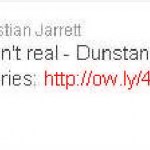science communication
I'm on Google+.
After a couple days of playing with it, I haven't quite identified what it is for, or at least how I'm going to use it differently from twitter or facebook, but so far I am generally impressed - it's easy, intuitive, and fast. It also allows you a level of selective privacy that - while possible to achieve - is very clunky on Facebook. It only took me 10 minutes on the web interface and another 10 minutes after downloading the Android app to figure out how it all worked. And Google+ is already far better integrated into the mobile user experience than Facebook is (though this…
Photo source.
The blogosphere can be a strange world for writers, offering vistas as broad ranging and fickle as human nature itself. Bloggers relying on pageviews for sustenance, even those who do not, face the challenge of attracting as many readers as possible, sometimes at the cost of becoming an uncivil "woo meister," provocateur or even worse, a demagogue.
From my first post at "Dean's Corner," I wanted to avoid these potential traps and to simply share what I love about science, sometimes bringing to light mistruths or misrepresentations - at least in my opinion. So,
I blog for…
American taxpayers are supporting more and more private faith-based schools, including anti-science creationist curricula, whether you like it or not.
Consider this, from an article draft that I am currently writing with Sir Harold Kroto:
From 1980 to 2001, the opening of private schools outpaced public schools by nearly two to one (15,131 vs. 8,130). During the same period, the number of private schools increased by 73% whereas the number of public schools only increased by 9%. Current data show that about two out of five schools are private, compared to one out of four in 1980. Three…
Photo source.
My recent post "Inquiring Readers Want to Know: "Why is My Poop Green?" generated an extraordinary amount of interest. Why?
In the previous post, I was exploring search terms that ScienceBlogs readers most commonly use as an indicator of their interest. I could have chosen any title, but decided to go with reference to the search term "Why is my poop green?"
Did readers' interest respond to a "poop factor," {silliness? scatological humor?} or was it because of the more extensive list I included from the top 500 terms that included, in my opinion, many more interesting…
My colleague Prof. Mark Boguski at the Harvard Medical School shared a provocative quote: True?
Not all psychopaths are in prison. Some are in the Boardroom.
Over at MedPageToday, they just completed an intriguing and informative series of articles about the psychology of psychopaths. According to Prof. Boguski:
...our 3-part series on psychopathy just concluded yesterday on MedPageToday.
Here's a summary of some of our tweets about it:
WANTED: Charming, aggressive, carefree people who are good at looking out for #1 http://bit.ly/kmj5oM
Also...
Corporate psychopaths: the sour cream…
Liquid mountaineering.
Photo source.
Curiouser and curiouser...
Intrigued by your interests on ScienceBlogs, I did an experiment.
I took a look at what you were searching for a year ago, during the month of June 2010 and uncovered some curious things. As in my last post {Inquiring Readers Want to Know: "Why Is My Poop Green?}, I focused on your top 500 keywords (out of 343,309.) Lists such as these could provide endless possibilities of topics for blog posts. There's simply not enough time - anyone want to help write some of these?
My prof got run over by an iPod
Liquid mountaineering…
Photo source, San Jose Library Flickr Photostream.
So you're on ScienceBlogs. What interests you, what are you looking for? As a regular blogger, I wanted to know.
One way to explore these questions is to take a random sampling of keywords that readers have used to search this site. I selected the past month and scanned the top 500 terms (out of a total of 292,566 - but who's counting?)
During this past month, there were 3,860,385 visits at ScienceBlogs. I learned something interesting. Take a look at some of my favorites, listed below and ranked from high to low popularity: {I may…
Miss California Alyssa Campanella wins the 2011 Miss USA Pageant. In preliminary judging, Campenella supported teaching evolution in public schools. In the finals, she gave a complex answer on legalizing marijuana.
Photo Credit: By Valerie Macon, AFP/Getty Images
This is my favorite story of the day:
The newly crowned Miss USA, Alyssa Campanella, 21, of Los Angeles said:
I was taught evolution in high school. I do believe in it. I'm a huge science geek...I like to believe in the big bang theory and, you know, the evolution of humans throughout time.
Of course, other contestants did not…
Source: Sheep purple Flickr Photostream.
Big Ag and antibiotics are becoming a lightning rod for a culture war of facts. Does agricultural use of antibiotics contribute to their diminishing effectiveness in people?
Liz Wagstrom, Chief Veterinarian of the National Pork Producers Council says no. In in a Letter to the Editor in The New York Times, she writes:
In fact, numerous peer-reviewed risk assessments show virtually no risk to humans from antibiotic use in animals.
...
The risk to public health from overuse or misuse of antibiotics comes overwhelmingly from human medicine, not…
I have been writing recently about the role of science in advertising as the "new glam." A Yoplait television ad brings a new dimension to this discussion. Is it possible for TV ads to deliver subliminal potentially harmful messages, whether intentional or not?
Ads are everywhere, of course, in all forms of media. The market research firm Yankelovich estimates that we are exposed to, incredibly, up to 5,000 ads per day!
Below is the commercial that sparked considerable controversy from a health advocacy group:
According to the National Eating Disorders Association:
"The language in this…
Dear readers,
I am delighted that I have joined journalist Chris Mooney at The Intersection, his blog for Discover magazine as a guest blogger. My first post addresses the question, Sexy Science: The New "Sizzle" in Advertising? I look forward to your comments.
Have you ever bought something that contained "no chemicals"? If you have, please let me know and share with Mary Carmichael, a Knight Science Journalism Fellow at MIT.
Here's one example of a product that is "lab-proven to kill the toughest of germs & viruses without the need for soap or water.":
You'll find no chemicals in Quash. Except these. Elsewhere on the website is this gem, titled "Know the Facts:"
"Why we don't use chemicals. Up to 70% of the chemicals we put on our skin are absorbed into our body. By the age of 30 we have up to 70 foreign chemicals in our system, many of…
Source.
Sperm counts declining due to environment and chemical hazards is, seemingly, commonplace knowledge. But a startling study just published in the journal Epidemiology debunks the concept.
Highlighted in The Science Times of The New York Times {June 7 edition}:
But now 15 years of data from 18-year-old Danish men taking their military physicals show no decline in sperm counts, after all. The idea that sperm counts were plummeting began with an alarming paper published in 1992 by a group of Danish researchers. Sperm counts, they reported, declined by 50 percent worldwide from 1938 to…
British teenage students have re-discovered a classical physical phenomenon, the Leidenfrost effect that could someday help ships glide through oceans more efficiently.
I'll let these 16 year old students explain it:
One day in Physics class we accidentally discovered you could get beautiful standing wave patterns on a drop of water on a very hot plate. This film gives an introduction to the wonderful Leidenfrost Effect.
The film was made by 16 students (aged around 16) - only three appear in the film, but everyone helped, as did their physics teacher. You can watch the video here.
Below I…
"An explosive power the size of a Hiroshima bomb - once a week."
Robert F. Kennedy, Jr.
Like most Americans, I would love to be able to drive without having to fill up with increasingly expensive gas - costly not only to our wallets, but to the environment and to geopolitics. Why not switch to a hybrid vehicle or even better, an electrical vehicle? Wouldn't an electrical vehicle offer a better, cleaner approach?
I imagine parking my new electrical vehicle in the garage, plugging it in overnight to recharge for a new day, unfettered by gas and oil, sleeping soundly. If only it could be so…
According to Fox News:
The World Science Festival is launched today, June 1, in New York City, and:
... promises a number of mind blowing revelations. Just consider these ideas, among the many to be presented over the next few days:
* The first person who will live 1,000 years has already been born;
* Our daily physical realities are merely holographic projections formed by light passing through a thin surface layer that surrounds the universe;
* Doctors will soon be able to diagnose diseases simply by smelling them;
* As depicted in the film, "The Matrix," the workings of…
Ed: This is an essay I wrote for my friends at the World Science Festival, riffing on the central themes of this years' event. If you prefer, you can also read this piece on the World Science Festival site. And, if you're in New York between the first and fifth of June, you could do much worse than popping into the Festival and getting a load of panel discussions like The Dark Side of the Universe, or Science & Story: The Art of Communicating Science Across All Media.
Science communication is difficult.
It can be crippled by the complexity of its own subject matter. It can be steeped in…
Every parent knows the frustration of responding to a baby's cries. Are they hungry? Wet? In pain? Need a hug? Tired?
According to Dunstan Baby Language, you can interpret these cries with confidence, reducing your stress and making you a better parent. Really?
According to their website:
The Dunstan Baby Language teaches you to hear exactly what your baby is communicating. As a parent, you will be able to interpret your infant's sounds and cries - and respond to their needs quickly and effectively.
There's more!
The Dunstan System will teach you how to tune your ear to the 5 'words',…
Source.
The Art of Science Learning is a superb blog about STEM education. Their posts provide us with insights from experts in science education. What would a young science student have to say?
An avid reader of Science cover to cover, this Letter to the Editor is one of my favorite pieces, written by a young High School student from Chapel Hill, North Carolina. What do you think?
I believe that Mr. Krolik is off to a great start!
As published in the May 6 issue of Science:
Letters
Bringing Research into the Classroom
As a high school student looking to pursue science, I was happy to…
Still from Woman in the Moon (1929, Fritz Lang) (via filmmuseum-potsdam.de) Walking on the moon without spacesuits!
Portrayal of science and scientists in media and film has for generations misrepresented what we do and who we are. Caricatures of the lone mad scientist toiling in the laboratory might capture our passion, but miss an essential point - that science is a social endeavor that can benefit society.
But are there four different kinds of science? A recent book suggests that there can be science four ways.
"Lab Coats in Hollywood - Science, Scientists, and Cinema" by David A.…

















